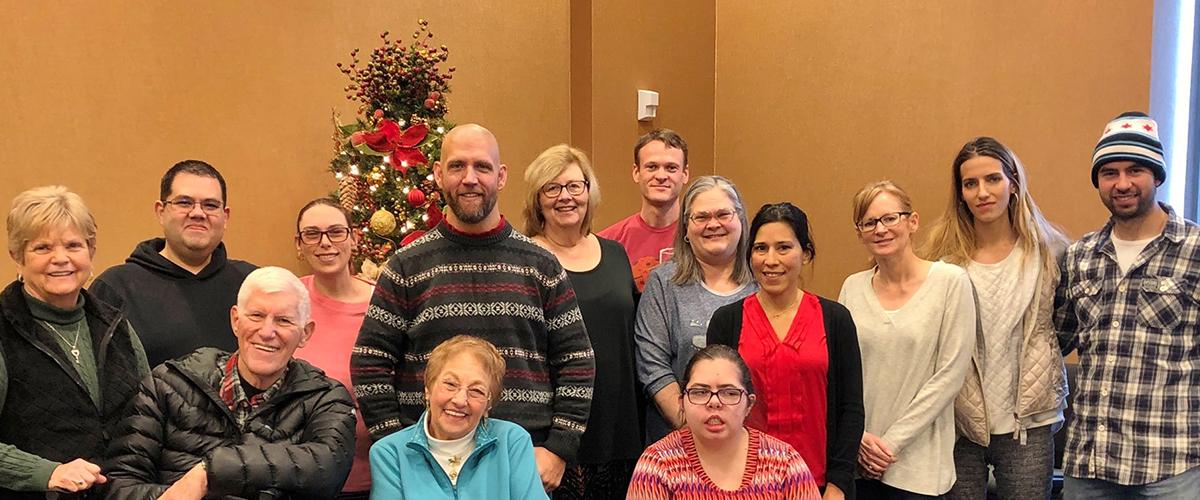Judy Marks remembers getting sick at age 32 and feeling like it was the worst flu she ever had, only it didn’t go away. Every part of her body seemed as if it were failing. She had always been active, working as a part-time nurse, raising two kids, and lifting weights during regular workouts. Suddenly, though, she couldn’t climb the stairs of her Raleigh, North Carolina, home and instead had to crawl up.
Her doctor dismissed it at first as being all in her head, although blood and muscle tests indicated something was wrong. Her sister for years thought she was faking her condition just to get attention. Her mother-in-law said she was “lazy.”
An Awakening
Though Judy had become resigned to living without a diagnosis, when her son Danny became ill at the age of 32, she became determined to find an answer. Danny lost the ability to swallow food and liquids, and developed problems breathing and walking. Judy took him from one doctor to the next. His illness worsened as he dropped to 100 pounds from a muscular 164 pounds in a period of just six months. When she brought him to a hospital in near-death condition, that put the fight into her.
Because he was known to local hospitals as someone with a history of drug addiction, Judy had trouble getting him admitted until her husband, a doctor, insisted. X-ray exams revealed the problem. Danny’s dramatic weight loss caused him to develop superior mesenteric artery syndrome, a rare gastro-vascular disorder in which the first part of the small intestine is compressed between two critical arteries. At the time, Danny was on the brink of suffering multiple organ failure and within hours of dying if doctors didn’t act. Surgery corrected the problem and saved his life.
It would take 26 years and visits to countless specialists before Judy got a diagnosis for her son, her father, and herself of myotonic dystrophy type 2 (DM2). It came only after leading medical centers in her area failed to provide answers. In desperation, she approached a pediatric neurologist with the suggestion that the three of them had one of three diseases, including DM2. The neurologist agreed and a genetic test confirmed they had DM2. That has changed things for Judy.
“It’s really bad when you don’t have a diagnosis because nobody thinks you are sick,” said Judy. “I knew I was really sick and that whatever it was wasn’t getting better. I did as much as I could as long as I could. I didn’t want to miss out.”
It also meant that the time spent searching for information about the mystery illness plaguing her father, son, and herself could now be focused on understanding DM2 and finding the best way to address the many problems that come with it.
Joining the MDF Community
MDF invited Judy to tell her story at its Patient-Focused Drug Development meeting held during the 2016 MDF Annual Conference. The day-long meeting with senior officials from the U.S. Food and Drug Administration (FDA), over one hundred patients and family members, academic scientists and industry professionals was convened to improve the agency’s understanding of the issues myotonic dystrophy patients face and what they hoped for from eventual therapies. During the meeting, Judy told FDA officials about the tremors and spasms that were violent enough to toss her out of bed. She explained the brain fog she experienced that caused her to get lost while driving familiar roads to her home. And she told them how her memory, once sharp, had begun to fail. She lived with ongoing pain that radiated from her head in the form of migraines, and caused burning pain in her feet. She explained that it hurts to breathe, speak, stand, sit, or roll over in bed.
“The fatigue steals the most from me,” she told FDA officials. “I'm pretty tough and can handle almost anything, but the exhaustion never, ever gives me a break. It's my shadow, my evil beast that never leaves. Looking back, I realize how much this has taken from me and my family.”
Where Judy finds joy these days is in spending time with her grandson Elijah, the child of her youngest son. Though she admits that in the past pride prevented her from asking for help from strangers, she’s now learned to do that if she is on the playground with Elijah and needs someone to lift him.
Despite her own illness, Judy serves as a caregiver as best she can to her husband, who is undergoing chemotherapy for metastatic cancer; her mother, who has Alzheimer’s disease; and her son with DM2. But she hasn’t given up on enjoying life.
When Judy was younger, she hoped to travel when she retired. Although she’s learned she has difficulty with long flights and needs to go to locations that can accommodate someone who is disabled, she refuses to give up on her dream, even if it means altering where she goes. She’s planning a cruise to Alaska once her husband completes his current round of chemotherapy.
“I’m really looking forward to that,” she said.

